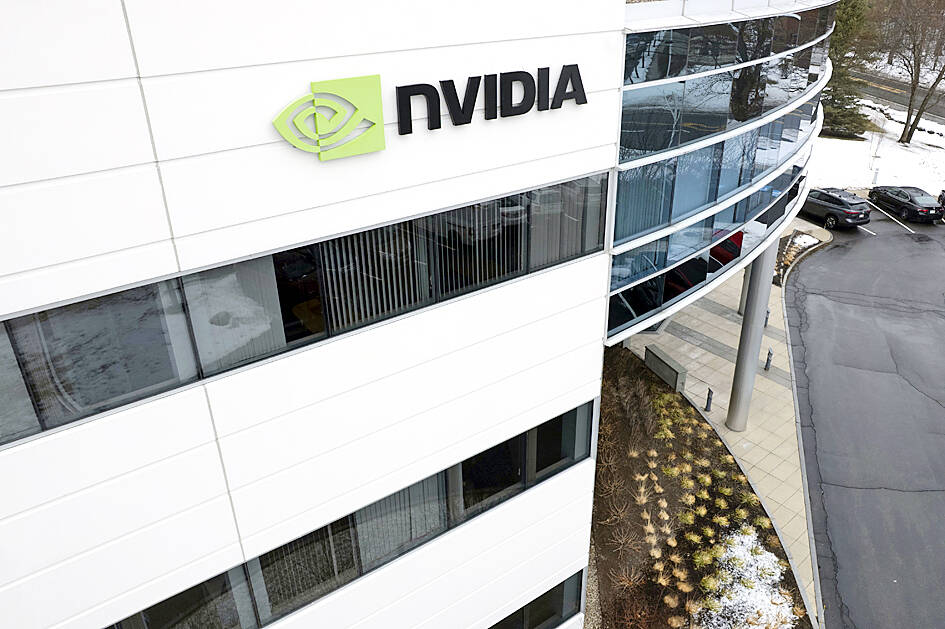Singapore charged three men with fraud in a case local media have linked to the movement of Nvidia’s advanced chips from the city-state to Chinese artificial intelligence (AI) firm DeepSeek (深度求索).
The US is investigating if DeepSeek, the Chinese company whose AI model’s performance rocked the tech world in January, has been using US chips that are not allowed to be shipped to China, Reuters reported earlier.
The Singapore case is part of a broader police investigation of 22 individuals and companies suspected of false representation, amid concerns that organized AI chip smuggling to China has been tracked out of nations such as Singapore.

Photo: EPA-EFE
Broadcaster Channel News Asia said it understood the cases were linked to the alleged movement of Nvidia chips from Singapore to be used by DeepSeek, without identifying its source.
Singapore’s government did not immediately respond to e-mail queries on whether the charges were linked to Nvidia and DeepSeek.
Charge sheets accused two Singaporeans, Aaron Woon Guo Jie, 41, and Alan Wei Zhaolun, 49, with criminal conspiracy to commit fraud on a supplier of servers last year.
They did this “by fraudulently making a false representation that the items would not be transferred to a person other than the authorized ultimate consignee of end users,” the court papers added.
The third person charged is Chinese national Li Ming, 51, accused of committing fraud on a supplier of servers in 2023 by saying Singapore-registered company Luxuriate Your Life Pte Ltd would be the end user of the items.
DeepSeek, Nvidia and Luxuriate Your Life did not immediately reply to requests for comment.
If found guilty of the offenses, the men could face penalties of a jail term of up to 20 years, a fine or both.
The police and charge documents did not elaborate on the items involved in the case, or identify the supplier of servers.
Police on Thursday said they had arrested nine people in a joint operation with customs authorities on Wednesday, raiding 22 locations from which they seized documentary and electronic records.
Singapore is Nvidia’s second-biggest market after the US, accounting for 18 percent of its total revenue in its latest fiscal year, a recent filing by the chipmaker shows. However, actual shipments to the Asian trading hub contributed less than 2 percent of total revenue, as customers use it as a center for invoicing sales to other countries.
Last week, Singapore’s minister of foreign affairs vowed to enforce multilateral export control regimes, saying the city state would not tolerate evasion, deception, false declarations or miscounting.

UNCERTAINTY: Innolux activated a stringent supply chain management mechanism, as it did during the COVID-19 pandemic, to ensure optimal inventory levels for customers Flat-panel display makers AUO Corp (友達) and Innolux Corp (群創) yesterday said that about 12 to 20 percent of their display business is at risk of potential US tariffs and that they would relocate production or shipment destinations to mitigate the levies’ effects. US tariffs would have a direct impact of US$200 million on AUO’s revenue, company chairman Paul Peng (彭雙浪) told reporters on the sidelines of the Touch Taiwan trade show in Taipei yesterday. That would make up about 12 percent of the company’s overall revenue. To cope with the tariff uncertainty, AUO plans to allocate its production to manufacturing facilities in

Taiwan will prioritize the development of silicon photonics by taking advantage of its strength in the semiconductor industry to build another shield to protect the local economy, National Development Council (NDC) Minister Paul Liu (劉鏡清) said yesterday. Speaking at a meeting of the legislature’s Economics Committee, Liu said Taiwan already has the artificial intelligence (AI) industry as a shield, after the semiconductor industry, to safeguard the country, and is looking at new unique fields to build more economic shields. While Taiwan will further strengthen its existing shields, over the longer term, the country is determined to focus on such potential segments as

TAKING STOCK: A Taiwanese cookware firm in Vietnam urged customers to assess inventory or place orders early so shipments can reach the US while tariffs are paused Taiwanese businesses in Vietnam are exploring alternatives after the White House imposed a 46 percent import duty on Vietnamese goods, following US President Donald Trump’s announcement of “reciprocal” tariffs on the US’ trading partners. Lo Shih-liang (羅世良), chairman of Brico Industry Co (裕茂工業), a Taiwanese company that manufactures cast iron cookware and stove components in Vietnam, said that more than 40 percent of his business was tied to the US market, describing the constant US policy shifts as an emotional roller coaster. “I work during the day and stay up all night watching the news. I’ve been following US news until 3am

COLLABORATION: Given Taiwan’s key position in global supply chains, the US firm is discussing strategies with local partners and clients to deal with global uncertainties Advanced Micro Devices Inc (AMD) yesterday said it is meeting with local ecosystem partners, including Taiwan Semiconductor Manufacturing Co (TSMC, 台積電), to discuss strategies, including long-term manufacturing, to navigate uncertainties such as US tariffs, as Taiwan occupies an important position in global supply chains. AMD chief executive officer Lisa Su (蘇姿丰) told reporters that Taiwan is an important part of the chip designer’s ecosystem and she is discussing with partners and customers in Taiwan to forge strong collaborations on different areas during this critical period. AMD has just become the first artificial-intelligence (AI) server chip customer of TSMC to utilize its advanced